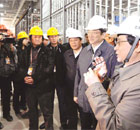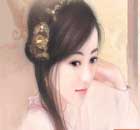Top Biz News
China acts to cool credit expansion
By Kevin Hamlin (China Daily)
Updated: 2010-05-03 09:14
 |
Large Medium Small |
Banks ordered to set aside more deposits as reserves
BEIJING - China ordered banks to set aside more deposits as reserves for the third time this year to cool a record credit expansion that has sparked the risk of asset bubbles in the world's third-largest economy.
The reserve requirement will increase 50 basis points effective from May 10, the People's Bank of China (PBOC) said on its website yesterday. The current level is 16.5 percent for the biggest banks and 14.5 percent for smaller ones.
Yesterday's move leaves benchmark interest rates unchanged, a strategy that reflects policy makers' preference for further evidence of a sustained global economic recovery before imposing higher borrowing costs. PBOC Deputy Governor Zhu Min said on March 25 that rate rises were a "heavy-duty weapon" and alternative measures were working well.
"They want to contain explosive growth in credit but they're cautious given the ongoing external uncertainties," David Cohen, an economist with Action Economics in Singapore, said before yesterday's announcement. "When inflation reaches 3 percent that'll catch their attention - and potentially could trigger a rate hike."
China's consumer prices rose 2.7 percent in February, the most in 16 months. The benchmark one-year lending rate remains at 5.31 percent. The one-year deposit rate is 2.25 percent.
Without stronger measures to rein in liquidity and stem asset-price gains, some economists may keep warning about a bubble that could destabilize the nation's economy. Citigroup Inc hedge fund manager Jim Chanos and Harvard University's Kenneth Rogoff have highlighted the danger of a boom and bust in coming years.
Premier Wen Jiabao's government is aiming to slow credit growth to 7.5 trillion yuan this year from a record 9.59 trillion yuan in 2009.
In the first two months of this year, Chinese banks lent about 28 percent of the government's target for 2010. Zhu, the PBOC deputy governor, said at a March 25 conference in Hong Kong that lending gains would see a "slowdown" in March from the previous month and that a moderation would be "healthy".
"We are very careful on the interest rate because it is a heavy-duty weapon," Zhu said at the Hong Kong gathering. PBOC Governor Zhou Xiaochuan also said in a March 23 interview that "extraordinary stimulus measures can gradually fade out" only after officials are "very certain" about a global economic recovery.
US Treasury Secretary Timothy F. Geithner's unscheduled meeting with Chinese Vice Premier Wang Qishan in Beijing on April 8 fanned speculation that the yuan may strengthen after being held at about 6.83 per dollar since July 2008. American lawmakers have stepped up calls for an end to what they label an unfair subsidy.
Inflows of so-called hot money from abroad, partly attracted by expectations that the yuan will gain, are complicating the central bank's efforts to soak up liquidity and reduce the risk that the economy will overheat.
The Shanghai Composite Index of stocks has fallen 12 percent this year in part on concern that a stimulus rollback will slow growth and profits.
China's central bank acted yesterday after data in recent weeks indicated economic growth was accelerating. A survey of purchasing managers released on April 1 showed manufacturing expanded at a faster pace in March than the previous month.
The economy grew 10.7 percent in the fourth quarter of 2009, the most in two years. The nation is poised to overtake Japan as the world's second-largest economy this year, when the Organization for Economic Cooperation and Development predicts it will contribute a third of global growth. It has surpassed the US as the top auto market and Germany as biggest exporter.
Exports rebounded and industrial production grew by the most in five years in January and February, cementing a recovery at Chinese factories. Still, officials cautioned that comparisons were flattered by depressed year-earlier levels.
Bloomberg News













